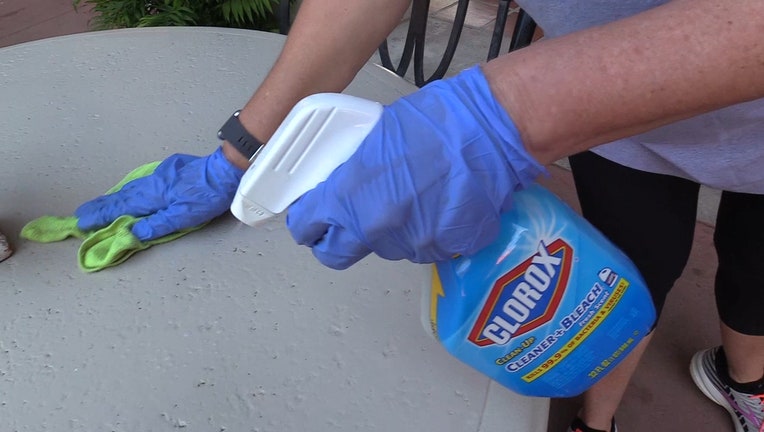Things you can do right now to stop the spread of coronavirus

There is no coronavirus vaccine and, after seeing what it's done and is still doing in countries like China, Iran and Italy, the virus has sparked widespread fear in the U.S.
The Centers of Disease Control and Prevention has maintained that the most effective way to prevent transmission is by avoiding any exposure to the virus.
MORE NEWS: Florida now has 216 positive cases of coronavirus, the Department of Health says
But that directive seems far easier said than done. Most Americans will still have to go to the supermarket to buy groceries, plumbers will have to make house calls and many municipal workers still have to report for duty.
Coronaviruses are considered zoonotic, which means they’re transmitted between animals and people, the World Health Organization said. The virus can have mild symptoms but can also lead to pneumonia, severe acute respiratory syndrome, kidney failure and death, the health body said.
Despite all of the coronavirus unknowns, little has changed in how medical experts believe you can best protect yourselves and your families.
The virus is known to affect its hosts with different levels of severity. It is not uncommon for those infected to not even know they have the virus and venture out into the public.
Jeffrey Shaman, a researcher at the Columbia University Mailman School who co-authored research that appeared in the journal Science, said these "stealth" transmissions play a major role in COVID-19's spread.
“We need to keep people apart,” he said, according to the Mercury News. The death rate is believed to be at about 2 percent. It was believed in late February that each infected person "spreads the infection to an additional two people.
Here's what you can do to contribute to your own health and the health of those around you.
WHAT WE KNOW ABOUT THE TRANSMISSION
The COVID-19 virus is primarily transmitted in microscopic droplets that are produced in an infected host’s cough or sneeze, according to Harvard Medical School. The virus is considered highly contagious. Australia's Department of Public Health says infection can spread from an infectious person 24 hours before exhibiting symptoms.
"COVID-19 is a new disease, so there is no existing immunity in our community," the health body said. "This means that COVID-19 could spread widely and quickly."
DON’T TOUCH PUBLIC SURFACES
The coronavirus can remain on a surface long after someone who was infected had touched it. Harvard says it is important—at the minimum-- to wipe down these surfaces with disinfectant. It is also important that a healthy individual avoids touching their mouth, nose or eyes.
The CDC reported that the transmission of the virus from surfaces has not been documented, but “current evidence suggests that novel coronavirus may remain viable for hours to days on surfaces” made with different materials.
LiveScience reported that "ethanol, hydrogen-peroxide or bleach-based cleaners are effective at killing those coronaviruses that survive on surfaces."
PRACTICE SOCIAL DISTANCING
Social distancing are practices implemented by public health officials to keep contagious diseases from spreading. Experts believe the virus is mainly spread through droplets that come out of your mouth and nose. When an infected person speaks or exhales or coughs or sneezes, the droplets travel about 3 to 6 feet before gravity pulls them to the ground. These droplets could otherwise be inhaled or land in the mouths or noses of those nearby.
WASH YOUR HANDS FREQUENTLY
The CDC recommends frequent handwashing amid the coronavirus outbreak. The process is simple: Take soap and run some water. Scrub your hands for at least 20 seconds, especially after being in public or blowing your nose. Soap is considered the best option, but if you do not have access, hand sanitizer with 60 percent alcohol is also recommended.
COVER COUGHS AND SNEEZES
The CDC insists that one of the best ways to prevent the spread of COVID-19 is to practice covering your mouth with a napkin or your elbow when you cough or sneeze.
STAY AT HOME IF YOU ARE SICK
COVID-19 is highly contagious and can have dangerous ramifications for the at-risk public. If you feel under the weather, stay home. If you absolutely must go outside, wear a facemask if you’re sick. If you do not have a facemask, let's say you’re on the way to a health care facility, do your best to cover your mouth if you cough. The CDC also recommends health care workers wear a mask if they treat a coronavirus patient.
"We're not being told to stay at home and lock the doors," said Dr. Willam Schaffner, a Vanderbilt University infectious diseases expert. “We're not there yet, and I don't think we'll get there.”
People who have coughs and sneezes should stay home as much as possible, and call ahead to the doctor's office if they're planning to get their illness checked out, he added.
People who have confirmed coronavirus illness should stay home, as should those who were in close contact with a confirmed case.
The Associated Press contributed to this report.

